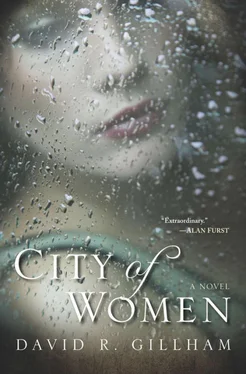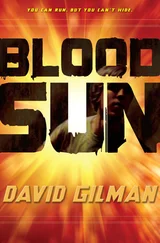The superintendent is a chubby old bear in an old-fashioned Reichsbahn uniform and a peaked cap set too low on his brow. He avoids eye contact, frowns as he unlocks the door at the end of platform, and steps away, seeing nothing.
The cold air and noise of the Möckernstrasse hit them stiffly as they step out onto the sidewalk, and the door thunks shut behind them.
“The tunnel,” Sigrid commands, and heads for the concrete stairwell below the sign that reads PLAZA PASSAGEWAY TO THE HOTEL EXCELSIOR. SHOPPING IN THE TUNNEL. The stairwell leads downward to a bustling corridor, dull yellow with the glow of subterranean lighting. Sigrid has a flash of her mother gazing into a dress shop window, while her father frowns at his watch, but the shops are closed now, NUR ANTRAPPEN notices in the windows.
“Follow me. Hurry, but don’t run,” Sigrid instructs. But Ericha suddenly seems frozen.
“Frau Weiss,” Sigrid calls, and hands off the little girl to her. “Go straight. We’ll catch up.”
When Sigrid turns back, all Ericha says is, “I can’t.”
“You can and you will, if I must drag you, Fräulein Kohl,” Sigrid informs her. “Now, move , please.”
Halfway through the tunnel, Sigrid risks a glance over her shoulder, but there is no sign of the Gestapo. Ahead, a circus clown with a painted red grin is collecting for Winter Relief beside a Party man in full brown regalia and a swastika armband. The clown gives Frau Weiss’s children a jaunty wave, and they gaze back at him widely. “How goes it, little ones?” the clown calls to them. “Can you give up your ice creams today so Mutti can make a donation?” Sigrid quickly intervenes, dropping coins into the collection urn.
“Heil Hitler,” the Party man says, and smiles, flapping her a German salute.
“Heil Hitler, and good afternoon,” Sigrid says, smiling back, but keeps everyone walking, slowing only to pick up the older girl. Good soldier Liesl. The trusting weight of the child in her arms touches something in her, but all she says is, “At the end of the corridor, go left up the steps.”
The stairs leading upward are many, though Sigrid keeps her gaze aimed at the rectangle of hard white daylight waiting for them. As they emerge into the Saarlandstrasse, her eyes search, but only for a instant, before she spots Rudi, crushing out his cigarette on his boot heel, and stuffing the unsmoked butt behind his ear. Flinging open the rear door of his cab, he asks, “Taxi, gnädige Frauen?”
Frau Weiss into the rear first with the little one, and then Sigrid deposits Liesl. “In, please,” she tells Ericha next.
“You knew,” Ericha concludes in a penetrating whisper; her voice sounds as if it is drilling through a deep fog. “You knew that it was me, didn’t you?”
“You’re aware of the rules,” Sigrid answers. “No questions. Now, in , please,” she repeats.
And this time Ericha offers no resistance.
• • •
THE DILAPIDATED CANVAS-TOPPED LORRY sits in the dim recesses of an alley beside a bombed-out Handwerk warehouse on the south side of the canal.
“It was just where you said it would be,” Rudi announces. “An Opel Blitz three-tonner.”
“It meets your high standards, I hope?” Sigrid says
A shrug. “It’s a bit of an ogre. The three-tonner handles like a barge full of rocks. But at least it has new tires. I haven’t seen new tires since 1938.”
“And the papers were in place?”
According to the registration, your driver will be a civilian contractor, with a permit to transport a war widow and her children from Berlin to Lübeck, after the family’s flat was bombed , Kaspar’s letter to her had read.
“All in order,” Rudi assure her. “Very neat.”
“Yes,” Sigrid nods as she surveys the lorry, thinking of Kaspar as she lightly touches the high, side-view mirror. “Very neat.”
Climbing into the cab, Rudi turns over the engine and leaves it idling, the tailpipe stinking of diesel smoke, and then hops back down to the asphalt. Lowering the rear gate, he shoves back the canvas flaps, revealing a conglomeration of mismatched furnishings.
“So should I ask where all the furniture came from?” Sigrid inquires.
Rudi lifts his eyebrows. “I had a chum help me. If a family is moving, I thought it should look convincing. Which means furniture.” He tosses away the nib of a cigarette. “There’s room up front for the lady and her children,” he says. “And a bench in the rear for the Fräulein. We should load up.”
Sigrid peers into a small shack by the taxis’ shed, where a coffeepot sits on an electric hotplate. Frau Weiss clutching a tin cup, with Liesl on her lap. Little Ruthi with her wooden tiger tapping across the wooden floor. Ericha lowers her cigarette as her eyes rise, but Sigrid still avoids her gaze. “It’s time to go,” is all she says.
Rudi lifts the little girls up onto the front seat. Sigrid watches them scoot to the middle with a mixture of uncertainty and anticipation. Then she speaks to Frau Weiss in a confidential tone, handing her a small envelope. “I picked these up at an apothecary. Sedatives. Mild enough for the girls. It’s a long trip to Lübeck, and it’ll help them sleep.”
“Thank you, Frau Schröder,” the woman replies, gripping Sigrid’s hand, her eyes warming with tears.
“Keep your children close, Frau Weiss,” Sigrid tells her.
“I will. Thank you ,” she repeats.
“Mama,” the little one calls, and waves the wooden tiger.
“When they reach Lübeck,” Sigrid says, “give them this kiss for me,” she smiles, and carefully kisses the woman’s cheek and watches her climb aboard.
Only now, when there is no other choice, does she look Ericha in the eyes.
“And so it’s you next,” she says. “Come, come. We don’t want the lorry to run out of petrol idling in the alley. Climb aboard.”
“Sigrid.”
“If you’re stopped, which you won’t be, but if you are, tell them that you’re visiting your fiancée in the Kriegsmarine. Heinrich. I think that’s a good name for a fiancée, don’t you? Heinrich Schuler of Third Port Battery Command. Now, climb aboard, or shall I have Rudi lift you up like one of the children? You’d do that for me, wouldn’t you, Rudi? Tell her.”
“I follow the gnädige Frau’s orders,” Rudi confirms. He raises one of the lorry’s hood covers and makes an adjustment, which causes the motor to growl impatiently. “But we must get moving. Lübeck isn’t exactly a Sunday drive.”
“Exactly so. Therefore, no delays, please. I’ve given Rudi your Reisepass along with your travel papers and money for your passage. For once, Fräulein Kohl, just do as you’re told . It’ll be a new experience for you.”
“You haven’t answered me,” Ericha says. Her eyes like shattered blue shards of crystal.
“What I knew , child, is that I wasn’t going to allow that baby inside of you to be born in a concentration camp. Nothing else. Only that.”
“I can’t.”
“Yes.”
“ I can’t simply leave .”
“ Yes . You can . It’s an uncomplicated process. You ride in a lorry till you reach a ship. Then you sail in that ship till you reach the shore of Sweden. And then you are safe.” She feels her eyes heating up. Going damp.
“You think I want to be safe?”
“I think that regardless of what you want , Fräulein Kohl, we must have you safe.”
Ericha stares. “And what about you?”
“Me?”
“Yes. Frau Schröder.” She swallows. “What about her?”
“She will continue,” Sigrid answers. She looks away to wipe the tears from her eyes. “What else can she do? Now, there’s nothing more to be said,” she declares, and clasps Ericha close. “Except good-bye.” Her eyes suddenly sting. “Think of me often, my dearest girl,” she whispers as she hugs her so very tightly. “I will always think of you.”
Читать дальше












